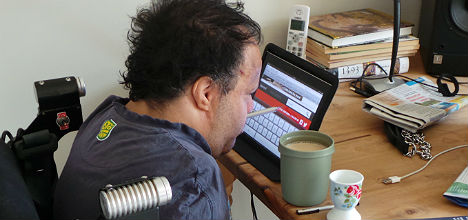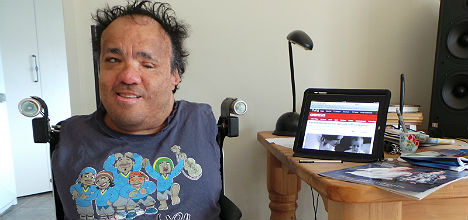This week's $99million class action settlement for victims of the morning sickness drug thalidomide is not the end of the case believes Papamoa thalidomide victim Terry Wiles.
Terry, who is one of the most disabled victims with no arms, legs and only one eye, won't be personally benefitting from the Victorian Supreme Court decision as he was not part of the class action, but he doesn't think any of the victims will be seeing the money soon.
Terry Wiles.

'I think what will happen is they will probably appeal it anyway, and that will take a long time as well,” says Terry.
'I think it's a really good idea, but I don't know what will happen now. Hand over the money - or, I get the feeling from what I have heard, that they will fight it.”
A class action by New Zealand and Australian victims of the morning sickness drug thalidomide against its manufacturer settled this week for A$89 million.
Many of the babies of women who took thalidomide were born with serious birth defects, including missing limbs.
Settlement of the class action taken against German pharmaceutical company Grunenthal, and thalidomide's Australian distributor, Distillers, bought by British company Diageo in 1997, will result in more than 100 people from Australia and New Zealand in the class action being paid A$89million, plus A$6.5million in costs, subject to court approval. The matter is adjourned to February 7 when it is expected to be formally approved.
It was revealed last year the German drug maker Grunenthal ignored and covered up repeated warnings that thalidomide could damage unborn babies. Files from the Grunenthal archives exposed a 50-year global cover-up.
An estimated 10,000 babies worldwide were born with severe physical deformities because their mothers took thalidomide.
It was claimed the manufacturer developed, patented and brought the drug to the Australian market between 1950 and 1955 and declared the drugs "safe, non-toxic, without significant side-effects, suitable for children and babies, an effective treatment for nausea, sleeplessness and anxiety, and on which it was impossible to overdose".
Marketed as Distaval, many women were given samples by their doctors.
The plaintiffs claimed the defendants conducted inadequate research into the safety of the drugs and failed in their duty of care to adequately warn consumers of the associated risks.
Meanwhile Thalidomide is back on the market being used as a cancer and HIV treatment, says Terry.
'They used it for treating cancer because it's really toxic. And it's also part of an AIDS treatment as well. If they can make money out of it they will do it.
'I heard it does really well against cancer – but it's still really kind of nerve wracking.”
Terry moved to New Zealand in the 1980s after receiving compensation. He also featured in the Emmy award winning BBC drama On Giant's Shoulders.



0 comments
Leave a Comment
You must be logged in to make a comment.